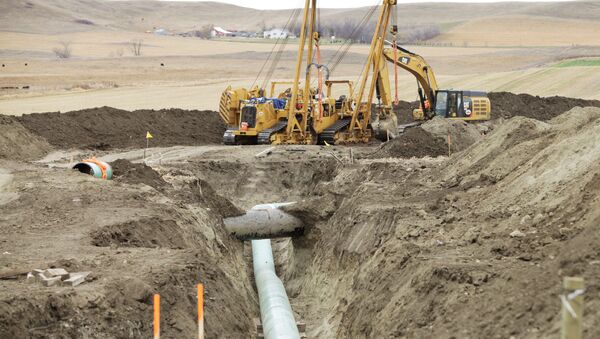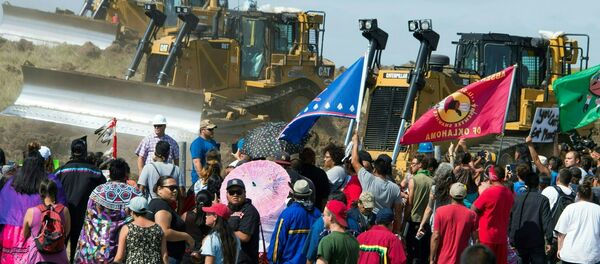Over 680 tons of oil from the Keystone pipeline have leaked into farmland in northeast South Dakota, pipeline controller TransCanada Corp. said Thursday after closing the pipeline.
"There was some legislation being pushed through our House [of Representatives]" and local governments "about… ‘what do we do when this happens,'" Renville said during an interview with By Any Means Necessary.
"Everybody knows that these pipelines are in our backyard, but what do we do when there's a spill?" she wondered.
One of the measures would hold oil companies accountable by allocating $0.05 from each barrel transported through the pipeline into a fund for if, and when, accidents occur. "Unfortunately, in a deep red [conservative] state, it was never passed," she explained.
TransCanada has said they will cover cleanup costs, but economic costs are not the only factor to consider in the wake of an oil spill. "How much money is being made over putting our land at risk, all of our sacred sites here," she asked. Sacred lands have no pricetag for those who hold them in divine regard.
While state officials said the pollution won't spread to drinking water systems, Renville said area residents are worried about one of the world's largest sources of underground fresh water, the Ogallala aquifer, becoming contaminated. The aquifer spans about 174,000 square miles underneath eight states: Wyoming, South Dakota, Nebraska, Colorado, Kansas, Oklahoma, Texas and New Mexico. According to Scientific American, Ogallala has enough water to cover all 50 US states with 1.5 feet of water.
Today we're talking about the #KeystonePipelinespill, #Wikileaks messaging with @DonaldJTrumpJr, @thedailybeast falsely reporting that @SputnikInt registered as a foreign agent and more!
— BAMNecessary (@bamnecessary) November 17, 2017
At 3:20 PM EST Call us at 202-521-1320 to give us your perspective on today's topics.. pic.twitter.com/fB0ibCFCvb
Still, Renville is no stranger to adversity. During a previous incident in which South Dakota Senator Heidi Heitkamp spurned Renville's plea to stand up against oil companies endangering the land of the First Americans with an oil pipeline, the activist responded with grace.
"Let's continue to stand in prayer, stay positive and show our strength and ability to adapt to situations that are meant to further our complacency. We have awakened and are now fully aware of a government who has barely come out of its haze of oppressive behavior. We have stirred the coals of a fire they have never been able to smoulder, in our beliefs we pray for everyone; even those who have done us wrong. Our prayers have included these local, state and national officials as we hope for an awakening within them as well," Renville wrote in an undated column for the Last Real Indians.
The @TransCanada tweet below is an attempt to minimize the scope of the oil spill's potential damage.
— BAMNecessary (@bamnecessary) November 17, 2017
— TransCanada (@TransCanada) November 16, 2017



